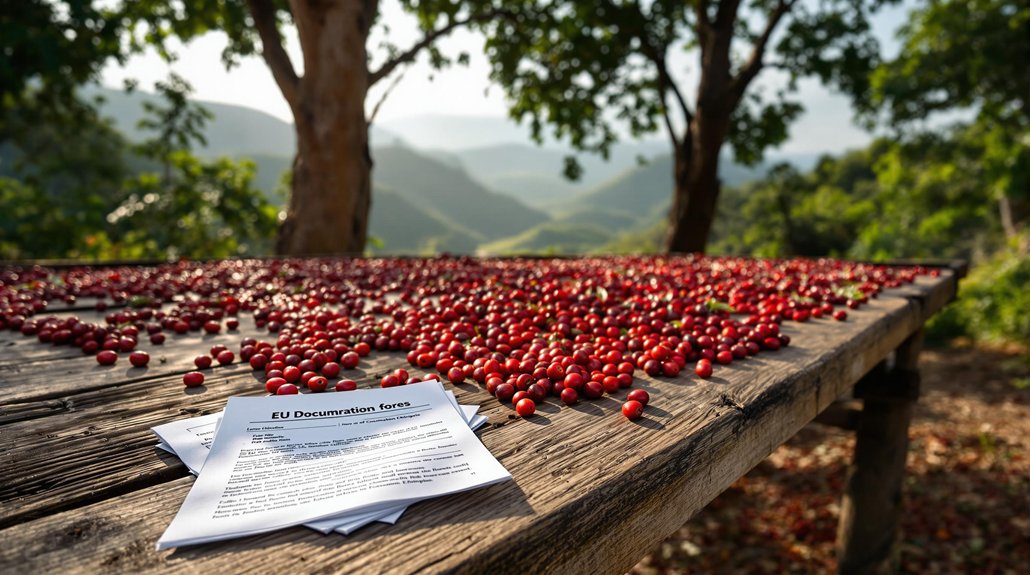Ethiopia’s lifeline to European coffee markets faces a serious threat. New EU deforestation rules demand paperwork that small farmers simply can’t provide. Ironic, really—these farmers have preserved coffee forests for generations, but bureaucrats want forms and documents. With 30% of exports going to Europe and $1.31 billion at stake, livelihoods hang in the balance. Alternative markets exist, but they won’t pay premium prices. The consequences could ripple through 15 million Ethiopian lives.
As Ethiopia’s coffee farmers tend to their cherished beans under the African sun, a looming threat from across the Mediterranean could destroy generations of tradition. The European Union, which buys roughly 30% of Ethiopia’s coffee exports, has rolled out deforestation rules so rigid they might as well have asked farmers to document the life story of each individual bean.
These new EU mandates require proof that coffee isn’t linked to deforestation after December 2020. Sounds reasonable, right? Except Ethiopian coffee production largely relies on smallholder farmers with tiny plots and minimal paperwork. Try explaining sophisticated traceability systems to a farmer whose family has harvested wild forest coffee the same way for centuries.
Coffee isn’t just another export for Ethiopia—it’s the economic lifeblood, generating $1.31B in 2023. Germany alone imported $97.8M worth last year, leading the European pack that sips Ethiopian beans each morning without a second thought.
Now these farmers must somehow “prove” their beans’ innocence or lose their biggest market. The math is brutal. Europe consumes. Ethiopia produces. The relationship worked fine until bureaucrats decided every bean needs papers. Farmers can’t comply, they don’t sell. They don’t sell, they don’t eat.
Ethiopia is scrambling to find alternative buyers—Saudi Arabia, China, the US—but replacing Europe’s coffee addiction isn’t simple. European markets are projected to grow 3-4% annually, and they pay premium prices for specialty varieties. That’s money Ethiopian communities desperately need. In fact, the United States imported $158 million of Ethiopian coffee in 2023, making it the second largest destination market.
The irony? These rules supposedly protect forests, yet might economically devastate the very people who’ve preserved Ethiopia’s coffee forests for generations. Meanwhile, Ethiopia’s fragmented supply chain—with its limited recordkeeping and minimal digitization—makes compliance nearly impossible. This comes at a time when the clean energy market is experiencing unprecedented growth worldwide, creating economic opportunities that Ethiopia could potentially leverage.
With approximately 15 million smallholder farmers dependent on coffee production for their livelihoods, these EU regulations threaten not just an industry but entire communities across Ethiopia’s coffee-growing regions.
Europe wants its morning coffee with a side of perfect documentation. Ethiopian farmers just want to sell their beans. Someone’s about to wake up disappointed, and it probably won’t be the Europeans.
References
- https://oec.world/en/profile/bilateral-product/coffee/reporter/eth
- https://www.mordorintelligence.com/industry-reports/ethiopia-coffee-market
- https://www.cbi.eu/market-information/coffee/what-demand
- https://www.agroberichtenbuitenland.nl/actueel/nieuws/2024/08/20/as11-ethiopias-coffee-crisis-navigating-eu-regulations-amid-sustainability-challenges
- https://www.statista.com/outlook/cmo/hot-drinks/coffee/ethiopia








